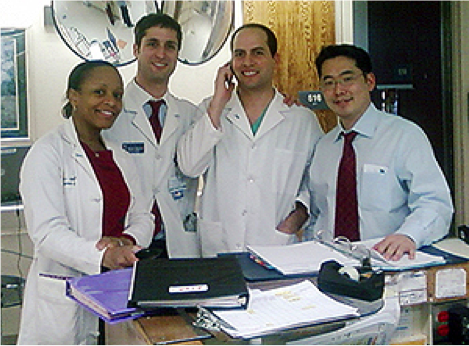About the Residency Program
Effective for the class beginning residency July 1, 2012 the urology residency is a 5-year program (1 year general surgery and 4 years of urology). The program accepts two residents a year through the American Urological Association match. It is expected that all urology residents complete their surgical internship at Westchester Medical Center or approved New York Medical College affiliated hospital. Rotations on the urology service are typically three months in duration. Research is an expected component of urology training. Residents will be paired with a clinical or basic science mentor to provide guidance in manuscript publication. Every attempt is made to send residents, regardless of training level, to any national conference their data is accepted to. In March 2010, the department received full accreditation from the Residency Review Committee. The RRC letter of accreditation did not list any issues, concerns, citations, areas of pending improvement or areas of non-compliance . Four, one-week vacations are provided each year. Benefits are provided through the Committee of Interns and Residents
Didactic Experience
The residency reserves Thursday mornings for formal academic didactic exercises in a Grand Rounds environment. All residents are expected to attend except those assigned to the MSKCC rotation where the resident attends the MSKCC Grand Rounds. Grand Rounds includes a 1 hour Journal Club where residents present salient and timely articles relevant to the Grand Rounds topic of the day and as chosen the month before by the Chief Resident and Program Director. The year’s Grand Rounds calendar follows a 2 year schedule in which all 16 Core Curriculum domains of the American Urology Association Educational Program are covered. A one hour lecture by faculty or invited speaker is arranged and PowerPoints used are saved on the departmental universal server. Grand Rounds is also used for the presentation of retrospective or prospective cases by faculty or residents followed by a domain- or disease-centered synopsis of the known literature on the subject. A monthly Morbidity and Mortality meeting, with mandatory attendance by all faculty, is held where Quality and Improvement (QI) opportunities are identified for further research. ‘5th Thursdays’ are devoted to basic science and resident research updates and presentations. Monday morning ‘Breakfast Club’ is used for the discussion of AUA updates under supervision of the departmental Chair.
Program Outcomes
The program has a 100% board pass rate since 2003 producing 25 of 25 residents who became board-certified by the ABU. Of the 25 residents, 12 have had additional training in fellowships. Since the graduating class of 2000, residents have practiced in 14 states including: California (7); Colorado (1); Connecticut (1); Illinois (2); Massachusetts (1); Minnesota (1); Nevada (1); New Jersey (3); New York (10); Pennsylvania (1); North Carolina (1); South Carolina (1); Texas (2); Utah (1). Two residents are in full time faculty positions, 22 in full time community or non-teaching positions, and 1 in part time academic/teaching positions.
Graduates have written or co-written: 41 Peer Reviewed Publications; 14 Book Chapters; 7 publications in non-print media; 2 nationally distributed surgical videos; for the national meeting of the American Urological Association (AUA), 62 meeting abstracts and videos; and 13 manuscripts at 53 national and international meetings since 2008.
Three graduates hold current leadership positions in the American Urologic Association and one graduate is a chairman of a urology residency program.
Rotations
PGY-1 (Pre-Urology): The resident will rotate through a variety of general surgery rotations with the expectation of leaning the perioperative management of complex surgical patients. Typical rotations include: Trauma, ICU, Surgical Oncology, Minimally Invasive Surgery, Vascular Surgery, General Surgery, Transplant Surgery, and Urology.
PGY-2/URO-1: The resident will spent 6 months each as the junior resident at Westchester Medical Center and Metropolitan Hospital Center. At Metropolitan Hospital the resident learns to manage a busy inner city clinic and develop the knowledge base to perform appropriate preoperative evaluation of presenting symptoms and postoperative follow up. The clinic has its own dedicated cystoscopy, urodynamics, and prostate biopsy procedure rooms. At Westchester Medical Center the junior resident is actively involved in working up complex consultations and gains significant exposure to ureteroscopy, inguinal/scrotal cases, and assisting in robotic surgeries. All Urology-1 residents are sent by the program to the AUA Basic Sciences Course in Charlottesville, Virginia.
PGY-3/URO-2: The resident spends three months at Lincoln Hospital as an Acting Chief Resident learning to run a service. During this rotation the resident is primarily in the operating room gaining significant exposure to open and endoscopic surgical techniques as either first assistant or surgeon for radical prostatectomy, nephrectomy, percutaneous nephrolithotomy, retroperitoneal lymph node dissection, slings, sphincters, and penile prosthesis. A three month rotation at Memorial Sloan Kettering provides exposure to a high volume of complex oncology cases. A second, three month rotation at Lincoln Hospital provides a unique opportunity for the Urology-2 resident to work with the Urology-4 resident. The goal of this second block is to provide a venue for soon-to-be graduate to have dedicated time to take junior residents through a variety of cases. Three months is allotted for research. Mentors are provided to allow for a productive experience in both clinical and basic science (bench and animal) projects.
PGY-4/URO-3: Six months are spent at Metropolitan Hospital as Chief Resident. As Chief Resident, the resident is expected to be exposed to all areas of urology. The Chief Resident is expected to be in charge of the service, overseeing the management of each case and discussing surgical modalities or alternatives with the patient and faculty in order to provide the optimal care. A three month rotation dedicated to robotic and laparoscopic surgery is spent at Hackensack University Medical Center. Three months is dedicated to rotating on one of the largest pediatric urology practices in the country. The pediatric urology rotator will gain high volume experience in all areas of pediatric urology from hypospadias to robotics to exstrophy. All URO-3 residents are sent by the program to the entire American Urological Association Annual Meeting.
